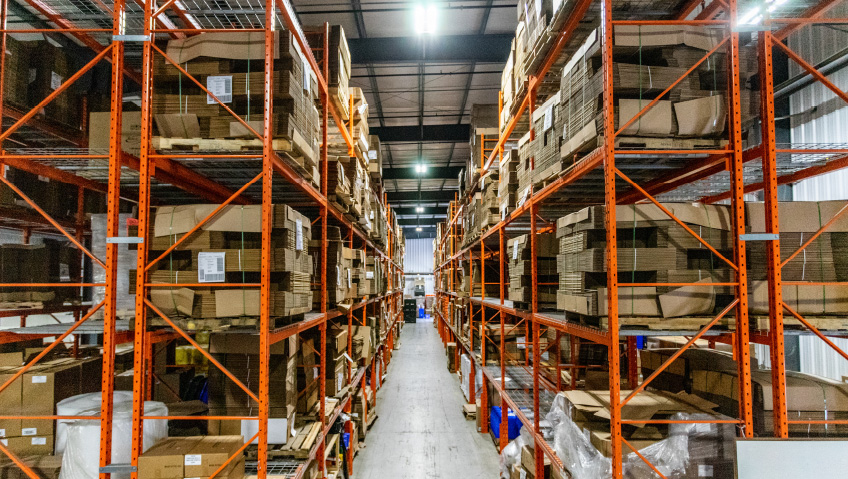Big changes have taken place at Peninsula Plastics Ltd., a start-to-finish custom injection moulding company in Fort Erie, Ontario, since it was profiled in February 2021’s Resource in Focus magazine. There has been a change of ownership in this family firm and some exciting new products—including a cutting-edge plastic garbage can.
Sadly, the biggest change “was my father passing away,” shares President Jake Bolton. Craig Bolton, who was interviewed for the previous profile, passed in the fall of 2021. Craig served as the company President. After his death, Jake, who had been Vice President, stepped into the top leadership spot while Jake’s younger brother, Lucas, and Plant manager, Patrick Park, have stepped up to help fill the void.
To honour Craig, the company has retained its focus on top-quality products and services, while upholding a loyal, experienced workforce. Peninsula continues to be a one-stop shop that offers a comprehensive range of services including consultation, modelling and industrial design, three-dimensional (3D) printing, part and mould design, manufacturing, packaging, warehousing, and shipping.
Consultations entail detailed discussions with clients and preliminary design work. Moulds can be custom designed according to customer specifications. Once a design has been chosen and successful prototypes have been built, the company will commence a production run of parts and moulds on its thirty-four custom injection machines and other processing equipment. This work is done in a 65,000-square-foot space at the company’s Fort Erie headquarters.
Across the street from the production center is Peninsula’s 30,000-square-foot warehouse for logistics work. The warehouse stocks customer products and inventory and this is where some light packaging is done. The company can provide display cases, blister and clamshell packages, and boxes, as well as perform heat sealing, labelling, and polyethylene bag packaging, to highlight and protect customers’ products. Logistics also covers brokerage duties and arranging pick-ups or deliveries for clients.
The company maintains a large inventory of a variety of plastic resins, which is very beneficial to its customers as they are able to pass on the savings of buying material in larger quantities. For commodity resins like polypropylene and polyethylene, there are four silos on-site which allow the company to purchase material in railcar quantities. Material in these silos can then be pumped directly to work centers without requiring a manual transfer of materials. This again provides added cost savings to customers. “We are looking at further improvements to this process by adding more silos and more advanced material conveying systems,” says Bolton.
Peninsula has a separate division called Nova Products that makes plastic goods such as glass case inserts, spools, and hydro components. Storage containers for recyclables are another Nova specialty; it makes ‘blue bins’ used to store paper and plastic recyclables and ‘green bins’ used to store kitchen and organic waste, primarily for municipalities. Blue bins include small, five-gallon units that can be fitted under desks, mid-sized stackable containers, and large twenty-two-gallon curbside bins. Green bins range from two-gallon kitchen containers to thirteen-gallon curbside units.
Nova has developed a brand new product: a thirty-two-gallon, black plastic garbage can, of which the company is particularly proud. “It’s light, compact, and made with superior materials, so it won’t break. It also has a “better aesthetic design,” than other garbage bins, according to Bolton.
The superior materials include impact-modified polypropylene. The garbage bin will be sold by retail outlets such as Home Depot, Home Hardware, and Walmart. The company is working on placing the thirty-two-gallon bin in Canadian Tire as well, he says.
In addition to its Fort Erie facilities, Peninsula uses a 20,000-square-foot, third-party warehouse in Buffalo, New York. This warehouse points to one of its strengths: the ability to ship products to both Canada and the U.S. with ease.
“It’s one of the things that sets us apart from other injection moulders. We’re literally on the border. The transfer of goods across the border is something we make extremely easy for our customers. We take the headache out of it,” Bolton states.
Other things also set the company apart. For a start, it maintains high standards of quality, with ISO and National Sanitation Foundation Institute (NSF) product certification. Based in Michigan, but with an international reach, the NSF offers product certification services in various fields including food equipment.
Peninsula has implemented Health Canada’s Good Manufacturing Practices (GMP) program and Critical Control Points (HACCP) system. The GMP program is designed to ensure high standards for packaging material, among other things.
The company has a client-centred business ethos. Customers can approach Peninsula with a vague concept that the company turns into a production-ready product. This process is driven by the use of 3D, computer-aided design software. It sometimes taps into the same skillset to fix problem moulds from other firms.
Peninsula uses 3D printers as well, but only for prototyping. Despite the hype about 3D printing, the process is still too slow and unwieldy to mass produce moulds or parts, says Bolton. “It’s not going replace injection moulding in this century. It doesn’t compare to the strength of injection moulding or the speed of injection moulding,” he points out.
Given this, Peninsula is eager to buy more custom injection machines, preferably bigger ones. At present, the largest machine the company owns has a clamping force of 1800 tons. Within a couple of years, it hopes to add a 2,500-ton machine to its lineup. “We’re looking to increase our tonnage. We’re looking for a bigger machine,” says Bolton.
For all the progress Peninsula is making, the company is still somewhat in recovery following COVID. “2021 was a tornado of a year, but things have been returning back to normal,” Bolton reports.
Certain health protocols remain in place; visitors are still required to sign in, and staff members, in general, are much more vigilant about the prospect of illness. Now that the virus appears to be finally receding, the company has taken to attending in-person trade shows again while continuing to enhance its online presence.
Prior to the pandemic, Peninsula employed 130 workers around the clock. This has been reduced to ninety employees working continuously for five days a week. Bolton hopes that the workforce has been only temporarily downsized.
Meanwhile, the company is striving to streamline its operations to increase efficiency. A few years ago, it acquired an enterprise resource planning software system for its offices. The system has proven its worth and the company is now “working on implementing bar code scanning and the Internet of Things into the workplace,” reports Bolton.
Peninsula’s human resources department has added new software as well, to track vacation time and other employee data. The software will eventually include online employee portals to help employees access their information faster and easier. The firm uses a fingerprint clock check-in for staff and is looking to expand its machine monitoring capabilities to keep an eye on cycles and production time.
In addition to software, the company has introduced robotic systems on its plant floor. Robots enhance both productivity and worker safety by taking on potentially dangerous tasks once performed by employees such as reaching into machines to remove parts.
For all the technological software and robotic solutions, Peninsula is fully aware of the importance of human relationships. The company builds employee loyalty. Staff members are eligible for a variety of benefits, including dental coverage and a registered savings program. Peninsula emphasizes internal promotions and likes to match experienced staff with new hires for intensive, hands-on training.
It tries to encourage a family-like work culture, which makes sense given its heritage. The company originated as a small custom injection moulding shop with a handful of machines and employees in Georgetown, Ontario. It was purchased by Jake Bolton’s grandfather in 1976 and moved to Fort Erie. Fred changed the name to Peninsula Plastics and expanded the operation. Craig took over in 1989, and now his two sons are heading the business.
Going forward, the plan is to keep Peninsula within the family and expand operations through moulding larger products. There is also talk about entering new product categories such as the home organization market. “We’re working on that now,” says Bolton.
There have also been discussions about setting up new branches in different cities. “Especially with shipping costs, we could definitely see ourselves branching out—trying to cover more of North America,” he says.






